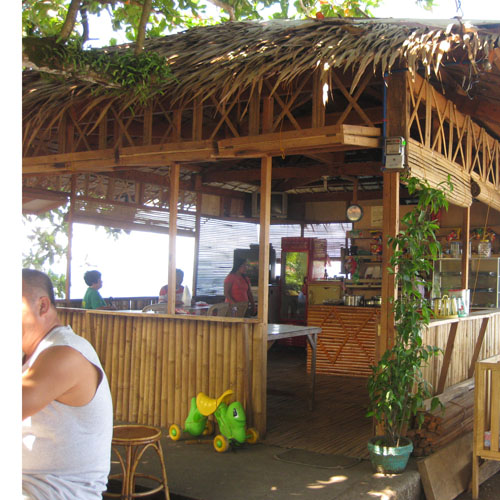The seaside nipa-hut style restaurant where Libagon students spend their lunch break eating and singing karaoke.
I have always wondered how my life would be like had my parents never left their hometown of Libagon, Southern Leyte for the United States. Having spent the last two weeks here in this town (where it’d only take you 15-20 minutes to walk from one end to the other),I’ve gotten a taste of what that life would be.
The best word to describe the lifestyle of Libagon residents is simple. Students attend school from 8 am until 4 pm. During their lunch breaks they’ll either get snacks from the street vendors, play computer games at the Internet Cafe, or sing a couple songs on the karaoke machine at the seaside restaurant (designed to look like a nipa hut).
Libagon can be compared to the city of Las Vegas because it is a town that never sleeps. From sunrise until sunset the town is alive with people who always have something to do. If they aren’t working, parents will pass the time by visiting friends and relatives to make kwnetuhan (share stories and gossip). Fishermen will get on their boats to catch fish or squid to sell. Young boys climb up palm trees to gather coconuts for a refreshing snack.
Even though I am not completely worry-free and have my Audrey assignments (like these series of posts) to do, I cannot help but feel calm and relaxed in this town. Everyone is so friendly and quick to help others out. Everyone knows each other and if they don’t they do not hesitate to introduce themselves.
I may not have been born here or know every family and their history like my parents, but Libagon is a very special place to me and I do feel at home.
However, I know I won’t ever be able to relate to the impoverished life that most people in this town live. Both my father and mother’s families are fairly well off, but they have always managed to stay humble and know that the best way to really give thanks to God for their blessings is to help those who are less fortunate than them.

My brother has celebrated his 5th, 13th and (most recently) his 18th birthday in Libagon. I can recall on the day of my brother’s 5th birthday, my mom and aunts were running around decorating the area along the beachfront where we would be holding the celebration. My brother started to cry because he noticed there were no gifts for him to be found. He sobbed to my mother, “Mommy, where are my presents? It’s my birthday!”
My parents took my brother aside and explained to him that here in the Philippines many children are not as lucky as him. They don’t have closets full of clothes or bedrooms full of toys. Some children aren’t even able to go to school because their parents do not have enough money to pay for their education.
As with all of his birthdays that have been celebrated in Libagon, my family invited many children to the party so that they could enjoy the many delicious food we had prepared: lechon (roasted pig), pancit (noodles), fried chicken, and fish among other dishes. It may just be one day out of the whole year that they can enjoy this kind of feast, but you can see in their eyes how happy and appreciative they are.
Once all the children are fed my parents distribute “presents” we brought for them from the United States. This year they brought a box full of various types of shoes for boys and girls and another box filled with notebooks, pens, pencils, calculators and other school supplies.

Living in the U.S. it can be easy for me to get caught up in my daily routine of working and worrying over petty things like a friend not returning a call right away, but when I see the big smile on a little boy or girl’s face over something as simple as a pack of pencils, reality hits me. My so-called problems are nothing in comparison to what many people deal with day in and day out in the Philippines. At the age of 5, my brother may have cried because he wasn’t receiving a table full of presents, but we both now know (thanks to the example set by our parents) the importance of sharing one’s blessings.









